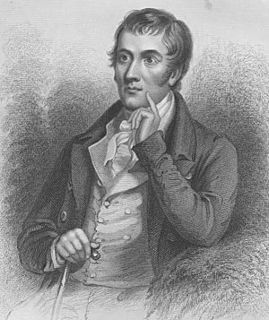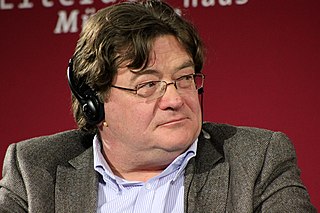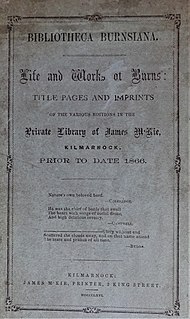
Ossian is the narrator and purported author of a cycle of epic poems published by the Scottish poet James Macpherson, originally as Fingal (1761) and Temora (1763), and later combined under the title The Poems of Ossian. Macpherson claimed to have collected word-of-mouth material in Scottish Gaelic, said to be from ancient sources, and that the work was his translation of that material. Ossian is based on Oisín, son of Finn or Fionn mac Cumhaill, anglicised to Finn McCool, a legendary bard who is a character in Irish mythology. Contemporary critics were divided in their view of the work's authenticity, but the current consensus is that Macpherson largely composed the poems himself, drawing in part on traditional Gaelic poetry he had collected.

Douglas Eaglesham Dunn, OBE is a Scottish poet, academic, and critic.

James Hogg was a Scottish poet, novelist and essayist who wrote in both Scots and English. As a young man he worked as a shepherd and farmhand, and was largely self-educated through reading. He was a friend of many of the great writers of his day, including Sir Walter Scott, of whom he later wrote an unauthorised biography. He became widely known as the "Ettrick Shepherd", a nickname under which some of his works were published, and the character name he was given in the widely read series Noctes Ambrosianae, published in Blackwood's Magazine. He is best known today for his novel The Private Memoirs and Confessions of a Justified Sinner. His other works include the long poem The Queen's Wake (1813), his collection of songs Jacobite Relics (1819), and his two novels The Three Perils of Man (1822), and The Three Perils of Woman (1823).

Allan Ramsay was a Scottish poet, playwright, publisher, librarian, and impresario of early Enlightenment Edinburgh.

Robert Tannahill was a Scottish poet of labouring class origin. Known as the 'Weaver Poet', he wrote poetry in English and lyrics in Scots in the wake of Robert Burns.

Donald Paterson is a Scottish poet, writer and musician.

The Fenian Cycle, Fianna Cycle or Finn Cycle is a body of early Irish literature focusing on the exploits of the mythical hero Finn or Fionn mac Cumhaill and his warriors the Fianna. Sometimes called the Ossianic Cycle after its narrator Oisín, it is one of the four groupings of Irish mythology along with the Mythological Cycle, the Ulster Cycle, and the Kings' Cycles. Timewise, the Fenian cycle is the third, between the Ulster and Kings' cycles. The cycle also contains stories about other famous Fianna members, including Diarmuid, Caílte, Oisín's son Oscar, and Fionn's enemy Goll mac Morna.

Andrew John Young was a Scottish poet and clergyman although recognition of his poetry was slow to develop.
"A Red, Red Rose" is a 1794 song in Scots by Robert Burns based on traditional sources. The song is also referred to by the title "(Oh) My Love is Like a Red, Red Rose" and is often published as a poem. Many composers have set Burns' lyric to music, but it gained worldwide popularity set to the traditional tune "Low Down in the Broom"

Thomas Hansen Kingo was a Danish bishop, poet and hymn-writer born at Slangerup, near Copenhagen. His work marked the high point of Danish baroque poetry.
Stewart Conn is a Scottish poet and playwright, born in Hillhead, Glasgow. His father was a minister at Kelvinside Church but the family moved to Kilmarnock, Ayrshire in 1941 when he was five. During the 1960s and 1970s, he worked for the BBC at their offices off Queen Margaret Drive and moved to Edinburgh in 1977, where until 1992 he was based as BBC Scotland's head of radio drama. He was Edinburgh's first makar or poet laureate in 2002–05.

John Burnside FRSL FRSE is a Scottish writer, born in Dunfermline. He is one of only three poets to have won both the T. S. Eliot Prize and the Forward Poetry Prize for the same book.

Vivienne Margaret 'Meg' Bateman is a Scottish academic, poet and short story writer. She is best known for her works written in Scottish Gaelic; however, she has also published work in the English language.

Poems, Chiefly in the Scottish Dialect, commonly known as the Kilmarnock Edition, is a collection of poetry by Robert Burns, first printed and issued by John Wilson of Kilmarnock on 31 July 1786. It was the first published edition of Burns' work. It cost 3 shillings and 612 copies were printed. The volume was dedicated to Gavin Hamilton. The Kilmarnock volume contained, besides satire, a number of poems like "Halloween", "The Twa Dogs" and "The Cotter's Saturday Night", which are vividly descriptive of the Scots peasant life with which he was most familiar; and a group like "Puir Mailie" and "To a Mouse", which, in the tenderness of their treatment of animals, revealed one of the most attractive sides of Burns' personality.

Christopher Whyte is a Scottish poet, novelist, translator and critic. He is a novelist in English, a poet in Scottish Gaelic, the translator into English of Marina Tsvetaeva, Pier Paolo Pasolini and Rainer Maria Rilke, and an innovative and controversial critic of Scottish and international literature. His work in Gaelic appears under the name Crìsdean MacIlleBhàin.

Robert Burns, also known familiarly as Rabbie Burns, was a Scottish poet and lyricist. He is widely regarded as the national poet of Scotland and is celebrated worldwide. He is the best known of the poets who have written in the Scots language, although much of his writing is in a "light Scots dialect" of English, accessible to an audience beyond Scotland. He also wrote in standard English, and in these writings his political or civil commentary is often at its bluntest.
Scottish Gaelic literature refers to literature composed in the Scottish Gaelic language, a member of the Goidelic branch of Celtic languages, along with Irish and Manx.
Events from the year 1724 in Scotland.

The Merry Muses of Caledonia is a collection of bawdy songs said to have been collected or written by Robert Burns, the 18th-century Scottish poet.

James M'Kie or James McKie (1816–1891) was an apprentice of Hugh Crawford, John Wilson's successor at the Kilmarnock Cross printing business. In 1867, M'Kie published the first facsimile edition of the 1786 "Kilmarnock Edition" or Poems, Chiefly in the Scottish Dialect as well as various bibliographies, reprints, special editions, limited editions, etc. of Robert Burns' and other works for the Scottish, British, British Empire or North American markets. He became an avid collector of Burnsiana and put together the largest collection of published in the world at the time, that was eventually purchased by the local Kilmarnock Corporation and housed in the Kay Park Burns Museum.
















